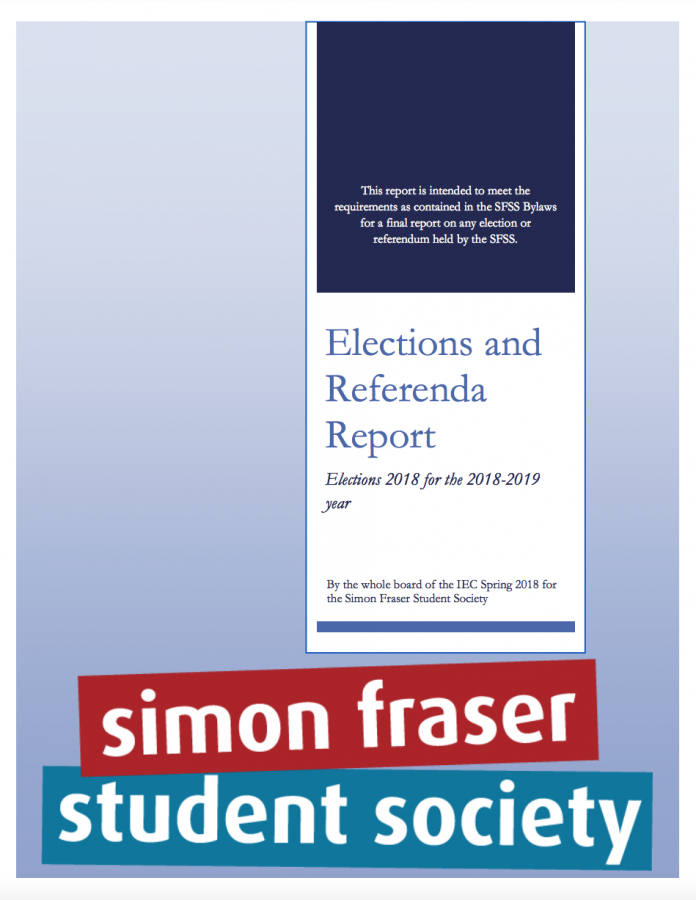The Simon Fraser Student Society (SFSS) Board of Directors meeting held on April 20 saw the Board reviewing the Elections and Referenda Report submitted by the Independent Electoral Commission (IEC) reviewing the practices of the 2018 SFSS elections.
According to the SFSS Elections and Referenda Policies, the IEC is composed of one Chief Commissioner and four Electoral Commissioners, and is “responsible for the administration of SFSS elections and referenda that is consistent in a manner consistent with all Society bylaws and regulations.” The IEC in this year’s election was headed by Dee Gorn acting as Chief Commissioner.
The document featured eight issues the IEC witnessed during the election cycle, and corresponding recommendations for each issue made by the Commission for future elections held by the Society. The report suggested that the election period relevant to reading week be extended by a week, as outreach work is not effective during the break and that debate booking be done earlier in future elections.
The report also highlighted job-related difficulties the IEC experienced, which involved excessive work hours, overlapping job responsibilities between the IEC and Communications Officer, and the IEC taking on extra duties such as policing endorsements.
The issue presented surrounding endorsements read, “Although, highly unethical, endorsements ran amok in the elections cycle. Ranging from external companies to Board members, these were difficult to eliminate without co-operation. Most complaints about candidates and also the IEC’s work revolved around this.”
The corresponding recommendation from the IEC suggested that, “Endorsements should be ignored as it is not the IEC’s responsibility to protect the reputation of the SFSS. The IEC failed to recognize this.”
Slates were recommended to be “banned as individuals should be able to campaign for themselves.” The report’s analysis determined that the permittance of slates resulted “a toxic electoral atmosphere.”
The report also noted that “many conflicts arose among candidates due to anti-social behaviour resulting from harassment to slander. This behaviour has been ongoing and is directed towards candidates, and members of the IEC.
“Incidents towards candidates include sexual harassment, social bullying, and spreading rumours of criminal activity.”
To address this issue, the IEC recommended “candidates submit 3 academic, work, volunteer or character references which should be checked by the IEC or an SFSS staff member (preferably IEC).”
The document was met with mixed responses in the Board meeting in which it was discussed.
The then business representative Gini Kuo commented: “I don’t think this report’s done very responsibly. Like it’s not very good. [. . .] I personally am not comfortable with this being a precedent of what’s an appropriate report for an election.”
The arts and social sciences representative at the time and current vice-president university relations Jackson Freedman recommended reaching out to all the candidates who ran in the election this year, “to compile a report maybe to complement the IEC report that comes from the people that had the experience is critical because I think they provide a perspective that, frankly, the IEC is not going to be incentivized to provide.”
SFSS CEO Martin Wyant attributed much of the stress during the election to the compressed nature of the election cycle, the inexperience of some candidates, and “having an IEC that, in many respects, is brand new when they get hired too.”
“So I think the middle ground that we want to occupy here is one where we can develop a plan to better prepare IECs, make sure they have proper training and support from us as staff people. We need to be very clear that we’re not to play any role in any regard with supporting any particular candidates,” said Wyant.
Moving forward in the vein of electoral reform, the Board discussed holding consultations with all the candidates of the elections, the Governance Committee, and the Communications Department to obtain a spectrum of perspectives on the electoral process.
SFSS Campaigns, Research, and Policy Coordinator (CRPC) Pierre Cassidy is currently putting together a report that will need to finalized by the Board before being made public. The report is expected to be finalized around the end of May.
“As for the IEC report, we will wait until we have all of the reports before commenting,” said outgoing SFSS President Hangue Kim.




